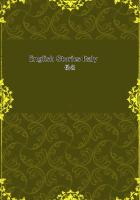How well I remember his triumph on that hot,June morning of our graduation from Densmore,a triumph he had apparently achieved without labour,and which he seemed to despise.A fitful breeze blew through the chapel at the top of the building;we,the graduates,sat in two rows next to the platform,and behind us the wooden benches nicked by many knives--were filled with sisters and mothers and fathers,some anxious,some proud and some sad.So brief a span,like that summer's day,and youth was gone!Would the time come when we,too,should sit by the waters of Babylon and sigh for it?The world was upside down.
We read the one hundred and third psalm.Then Principal Haime,in his long "Prince Albert"and a ridiculously inadequate collar that emphasized his scrawny neck,reminded us of the sacred associations we had formed,of the peculiar responsibilities that rested on us,who were the privileged of the city."We had crossed to-day,"he said,"an invisible threshold.Some were to go on to higher institutions of learning.
Others..."I gulped.Quoting the Scriptures,he complimented those who had made the most of their opportunities.And it was then that he called out,impressively,the name of Ralph Forrester Hambleton.Summa cum laude!Suddenly I was seized with passionate,vehement regrets at the sound of the applause.I might have been the prize scholar,instead of Ralph,if I had only worked,if I had only realized what this focussing day of graduation meant!I might have been a marked individual,with people murmuring words of admiration,of speculation concerning the brilliancy of my future!...When at last my name was called and I rose to receive my diploma it seemed as though my incompetency had been proclaimed to the world...
That evening I stood in the narrow gallery of the flag-decked gymnasium and watched Nancy dancing with Ralph.
I let her go without protest or reproach.A mysterious lesion seemed to have taken place,I felt astonished and relieved,yet I was heavy with sadness.My emancipation had been bought at a price.Something hitherto spontaneous,warm and living was withering within me.
V.
It was true to my father's character that he should have waited until the day after graduation to discuss my future,if discussion be the proper word.The next evening at supper he informed me that he wished to talk to me in the sitting-room,whither I followed him with a sinking heart.
He seated himself at his desk,and sat for a moment gazing at me with a curious and benumbing expression,and then the blow fell.
"Hugh,I have spoken to your Cousin Robert Breck about you,and he has kindly consented to give you a trial.""To give me a trial,sir!"I exclaimed.
"To employ you at a small but reasonable salary."I could find no words to express my dismay.My dreams had come to this,that I was to be made a clerk in a grocery store!The fact that it was a wholesale grocery store was little consolation.
"But father,"I faltered,"I don't want to go into business.""Ah!"The sharpness of the exclamation might have betrayed to me the pain in which he was,but he recovered himself instantly.And I could see nothing but an inexorable justice closing in on me mechanically;a blind justice,in its inability to read my soul."The time to have decided that,"he declared,"was some years ago,my son.I have given you the best schooling a boy can have,and you have not shown the least appreciation of your advantages.I do not enjoy saying this,Hugh,but in spite of all my efforts and of those of your mother,you have remained undeveloped and irresponsible.My hope,as you know,was to have made you a professional man,a lawyer,and to take you into my office.My father and grandfather were professional men before me.But you are wholly lacking in ambition."And I had burned with it all my life!
"I have ambition,"I cried,the tears forcing themselves to my eyes.
"Ambition--for what,my son?"
I hesitated.How could I tell him that my longings to do something,to be somebody in the world were never more keen than at that moment?
Matthew Arnold had not then written his definition of God as the stream of tendency by which we fulfil the laws of our being;and my father,at any rate,would not have acquiesced in the definition.Dimly but passionately I felt then,as I had always felt,that I had a mission to perform,a service to do which ultimately would be revealed to me.But the hopelessness of explaining this took on,now,the proportions of a tragedy.And I could only gaze at him.
"What kind of ambition,Hugh?"he repeated sadly.
"I--I have sometimes thought I could write,sir,if I had a chance.Ilike it better than anything else.I--I have tried it.And if I could only go to college--""Literature!"There was in his voice a scandalized note.
"Why not,father?"I asked weakly.
And now it was he who,for the first time,seemed to be at a loss to express himself.He turned in his chair,and with a sweep of the hand indicated the long rows of musty-backed volumes."Here,"he said,"you have had at your disposal as well-assorted a small library as the city contains,and you have not availed yourself of it.Yet you talk to me of literature as a profession.I am afraid,Hugh,that this is merely another indication of your desire to shun hard work,and I must tell you frankly that I fail to see in you the least qualification for such a career.You have not even inherited my taste for books.I venture to say,for instance,that you have never even read a paragraph of Plutarch,and yet when I was your age I was completely familiar with the Lives.
You will not read Scott or Dickens."















